Stop Replaying
the Tape
Likely the first thing that happens after we recognize we've made a mistake is to play it over and over again in our mind. Of course, it's important to process your actions, but going over what happened again and again won't do anything but torment you. If you catch yourself doing it, stop and take some deep breaths. Interrupting the thought pattern will steer you away from the negative loop and reduce stress and anxiety.
Recognize Why
It Happened
Sometimes this can be difficult. If you're having trouble seeing what led to this mistake, Jordan Pickell, a relationship and trauma therapist suggests journaling. This can help you understand your inner critic, develop self-compassion and even identify thought patterns that are sabotaging your ability to move past a mistake.
Acknowledge
the Lesson
Pickell also believes in the power of speech. Saying out loud what happened or maybe what you learned from the whole ordeal can help you make sense of it. When you give a voice to the thoughts in your head (along with the emotions in your heart) they don't seem as overwhelming as when they're swirling around inside you. Izadi agrees that acknowledging the lesson is the key to freeing yourself from the burdens of past mistakes. She also believes that you can recognize that some things that feel like problematic mistakes now were, in fact, solutions that served us at one point in time. Once you see them as such, it's easier to understand why you made the choice you did and understand that you'd make a different one now.

































